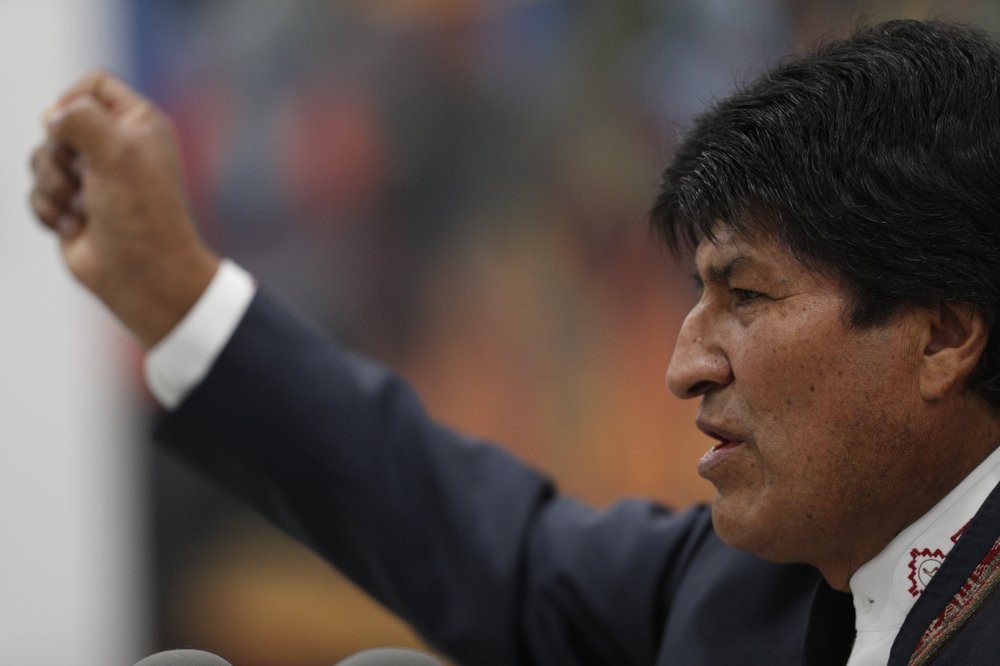Bolivia’s Morales claims outright win in presidential vote

By CARLOS VALDEZ
LA PAZ, Bolivia, Oct 24 (AP): Bolivia’s Evo Morales declared himself the outright winner of the country’s presidential election Thursday, giving himself a fourth straight term in office following days of protests by both his opponents and supporters over accusations of vote fraud.
With more than 98 percent of the votes counted from Sunday’s election, Bolivia’s first indigenous president said he had the 10 percentage point lead over his nearest rival, former president Carlos Mesa, needed to win outright and avoid a second round runoff.
“We have won in the first round. There are 1.58% (of the votes) left to count but we won with the rural vote,” Morales, the region’s longest ruling president, told a press conference.
Mesa announced that he would form an alliance to “defend the vote” in the streets and alleged that the president had perpetrated “a monumental fraud” to get re-elected.
The Andean nation had been on a knife-edge since the close and bitterly disputed vote. If it had gone to a second round runoff between Morales and Mesa, analysts said a united opposition might have stood a chance of defeating the incumbent president.
As the morning broke, the official vote count moved him to a 10-point lead, with about 1.5% of the votes still to be counted he led Mesa 46.83% to 36.7%.
International vote monitors have expressed concern at an earlier unexplained daylong gap in reporting results before a sudden spurt in Morales’ vote percentage. Opposition backers continued to stage rowdy protests since the vote, while Morales’ backers staged a march in the capital to show their support for the president.
Morales has repeatedly said that he won outright and that his opponents are conspiring to oust him. He earlier said that a quick count of the vote also gave him a first round win.
“I want to denounce to the people and the world that a coup d’etat is underway,” Morales said at a news conference Wednesday. “The right wing has prepared it with international support.”
Morales did not specify where the alleged international support for the coup was coming from, but he regularly rails against U.S. imperialism in Latin America.
He cited the burning by protesters of electoral offices in two cities where votes are being tallied as proof of the coup. Protesters also burned ballots in a third city.
Suspicions of electoral fraud rose when officials abruptly stopped releasing results from the quick count of votes hours after the polls closed Sunday with Morales topping the eight other candidates, but also falling several percentage points short of the percentage needed to avoid the first runoff in his nearly 14 years in power.
Twenty-four hours later, the body suddenly released an updated figure, with 95% of votes counted, showing Morales just 0.7 percentage point short of the 10-percentage point advantage needed to avoid a runoff.
That set off an uproar among the opposition and expressions of concern by international monitors.
The observer mission of the Organization of American States asked for explanations and the European Union and the U.N. expressed concern about the electoral process and called for calm. The United States and Brazil, among others, also expressed concerns.
Michael G. Kozak, acting U.S. assistant secretary of state for the Western Hemisphere, warned Wednesday that Bolivian authorities will be held accountable if the process isn’t fair.
“I think you will see pretty strong response from the whole hemisphere, not just the U.S.,” Kozak said during a House hearing.
In Caracas, Venezuela’s socialist president, Nicolas Maduro, voiced support for his ally Morales.
“It is a coup d’etat foretold, sung and, one can say, defeated,” he said.
The crisis was aggravated by the resignation of the vice president electoral council, Antonio Costas, who said he disagreed with the decision to interrupt transmission of the vote count.
On Tuesday, the Andean nation saw a second night of violent protests in several cities. Then on Wednesday, a strike that mostly affected transportation erupted in Santa Cruz, the most populous eastern region and an opposition stronghold, while Morales supporters clashed with his foes in one of the city’s slums.
Protesters in other regions announced that they would join to demand respect for the vote.
Recent News

Do not make expressions casting dout on election: EC
14 Apr, 2022
CM Bhatta says may New Year 2079 BS inspire positive thinking
14 Apr, 2022
Three new cases, 44 recoveries in 24 hours
14 Apr, 2022
689 climbers of 84 teams so far acquire permits for climbing various peaks this spring season
14 Apr, 2022
How the rising cost of living crisis is impacting Nepal
14 Apr, 2022
US military confirms an interstellar meteor collided with Earth
14 Apr, 2022
Valneva Covid vaccine approved for use in UK
14 Apr, 2022
Chair Prachanda highlights need of unity among Maoist, Communist forces
14 Apr, 2022
Ranbir Kapoor and Alia Bhatt: Bollywood toasts star couple on wedding
14 Apr, 2022
President Bhandari confers decorations (Photo Feature)
14 Apr, 2022











